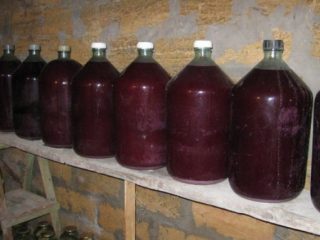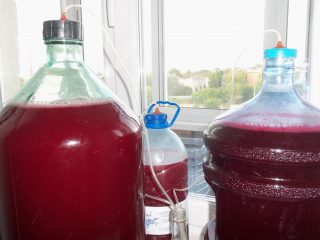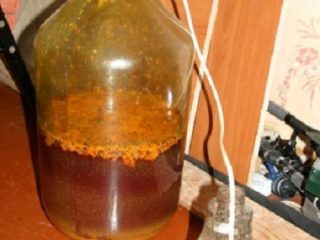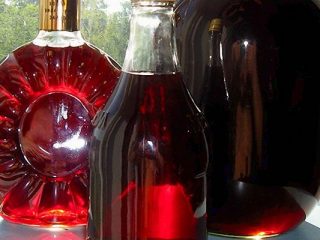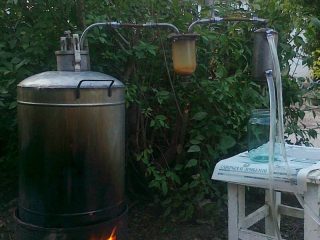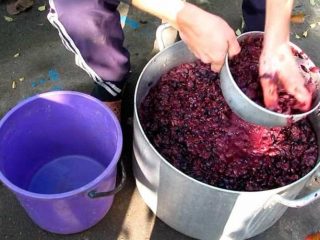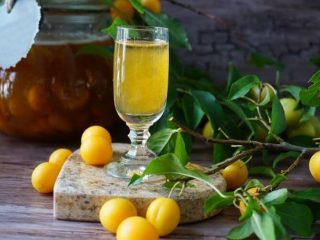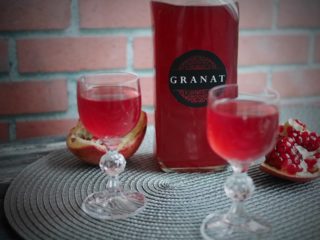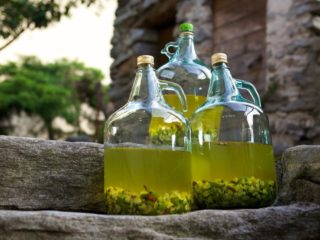Content
Novice winemakers may be interested in the question, why fortify homemade wine? The fact is that often the alcohol concentration in a homemade drink is too low. Because of this, wine may lose its taste, color and aroma over time. Fastening allows you to achieve the desired concentration of alcohols. Thanks to this, fermentation stops, or, more precisely, the fermentation process ends. This article will discuss in detail how this procedure is carried out and what needs to be used for this.
How to make fortified wine at home
Fortified wine is a drink whose strength is enhanced by a stronger alcoholic drink (spirit or vodka). Typically, the strength of such wine ranges from 15 to 22 degrees. This result cannot be achieved by fermentation alone. When the alcohol level in the drink rises to 13%, the wine automatically stops fermenting. Therefore, it is customary to add alcohol or purified vodka to fortified wines. Moreover, this can be done at completely different stages. You can add alcohol to berry juice, already fermenting or young wine at the final stage of preparation.
There are different ways to mount wine. They are all different and also have some features. The fermenting wort is not squeezed out during alcoholization.Simply mash the fruits, add sugar syrup to the berry mixture and leave the bottle of wine in a warm room for further fermentation. This process can last from 3 to 5 days. During this time, the amount of sugar in the drink should drop to 7–9%. At this stage, the wort must be squeezed out, and alcohol with a strength of 90% must be added to the resulting juice. In this form, the drink should be infused for 7 days. Next, the wine is drained, clarified if necessary and bottled. It is advisable to leave the resulting young wine to mature for a couple of years. The result is a wonderful drink with a complex, pleasant taste and aroma.
The main thing in this process is to correctly calculate the amount of alcohol. Making accurate calculations can be quite difficult. It is generally accepted that to increase the strength by 1%, alcohol should be added in an amount of 1% of the volume of wine. Accordingly, you will need 2 times more vodka, that is, 2%. For example, to increase the strength of 10 liters of wine by 5%, you should add 500 ml of alcohol or 1 liter of vodka.
How to fix wine with sugar
Before fixing homemade wine, you should understand some criteria. Each drink has its own level of sugar and alcohol content. Dessert wines have an ABV of 15 to 20% and the amount of sugar is approximately 1.2%. Liqueur wine is stronger, from 16 to 40%, sugar - 1.5%. Rose table wine contains no more than 11% alcohol and 1 to 1.5% sugar.
You should also know the proportions when adding sugar. If you add 20 grams of granulated sugar to a liter of wort, the strength will increase by 1%.But there is no need to overdo it, since too much sugar can, on the contrary, inhibit the fermentation of the drink.
Sugar is added to dry and dessert wines in different ways:
- To fix dry wines, sugar should be diluted in water and poured into the drink in one go.
- Sugar for dessert wines is dissolved in the drink itself. A small amount of granulated sugar and wine is mixed and introduced in several additions on days 1, 4, 7 and 10.
Fortified wine at home recipe with alcohol
Let's look at how to mount cherry homemade wine. For this we need the following ingredients:
- ripe cherry;
- special yeast starter (300 ml of starter per liter of juice);
- 96% alcohol (per liter of wine from 300 to 350 ml).
For preparation, take sweet cherries. You need to remove the seeds from it and squeeze out the juice. After this, the resulting juice is poured into a bottle and a small amount of water, granulated sugar and the prepared starter are added there. Next, the bottle should be placed in a warm place for 5 or 6 days. After this, the juice is carefully drained from the sediment and poured into a washed bottle. Now you need to pour alcohol into the container and infuse the drink in this form for about six months.
Fortified wine made from grapes and herbs
The favorite drink of many winemakers is vermouth. This wine is prepared from grapes at home. Vermouth is commonly called fortified drinks with the addition of bitter herbs. They are often used as an additive for coffee or tea. Many alcoholic cocktails are also prepared based on vermouth.Many people like to use such drinks as an aperitif, that is, to improve their appetite before eating.
Absolutely any wine can be used as a basis for making vermouth. For example, you can make a drink from one grape juice, or you can make a more complex vermouth from different berries. Rowan and cranberries are perfect for this; when combined they give a very beautiful rich color.
Let's look at one of the classic options for making vermouth. The main ingredients we need are:
- 100 ml of alcohol or 250 ml of vodka;
- four grams of medicinal yarrow;
- three grams of wormwood;
- three grams of mint;
- cinnamon stick (three grams);
- two grams of cardamom boxes;
- one gram of saffron;
- two grams of nutmeg.
Let's look at how to make a fortified homemade grape wine and herbal tincture:
- All prepared herbs are placed in a separate glass container and filled with alcohol or vodka. The tincture must be shaken every 24 hours.
- If you don't like wormwood, you can replace it with tarragon. The amount of both the first and second ingredients remains unchanged. But you should still taste the tincture. The fact is that wormwood can have varying degrees of bitterness. It all depends on the growing conditions and the specific variety. The tincture should not be too bitter.
- When adding tincture to grape wine, it is necessary to take into account the proportions. For a liter of drink, take no more than 50 ml of tincture with alcohol or 120 ml of tincture with vodka.You should also add granulated sugar to the vermouth. For this amount of wine, 100 grams of sugar is enough. In this matter it is better to be guided by your own taste. Next, the vermouth is thoroughly mixed.
- It's time to pour the vermouth into clean glass bottles. Do not fill the container to the brim; leave half the neck empty. It will take time for the tincture to fully develop its taste and aroma. After 20–30 days, vermouth will be completely ready for consumption. You can store vermouth for a long time without spoiling.
Conclusion
This article showed how to determine the strength of homemade wine depending on the ingredients. We also learned how to increase alcohol content using vodka and alcohol. Wine fortification is a great way to extend the shelf life of your drink and make your homemade wine stronger. This method is suitable for a wide variety of wines. The main thing is to correctly calculate the required amount of alcohol.





